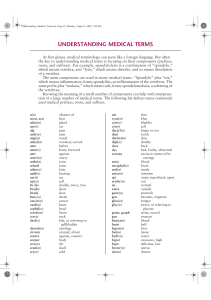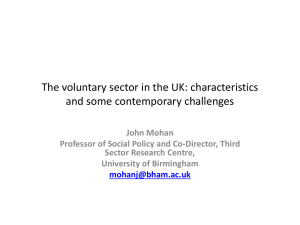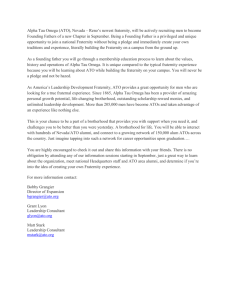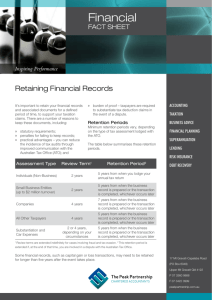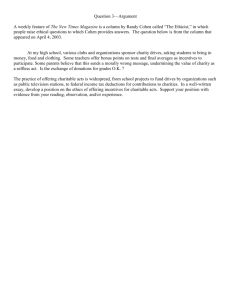Aid/Watch Forum notes - Melbourne Law School
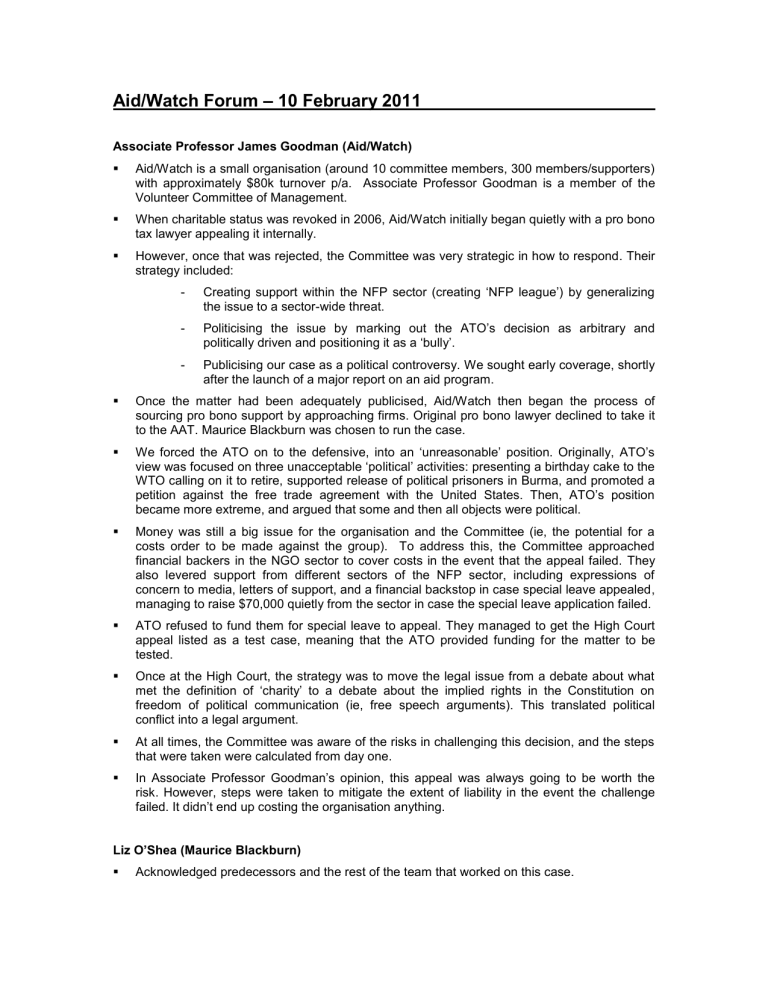
Aid/Watch Forum – 10 February 2011
Associate Professor James Goodman (Aid/Watch)
Aid/Watch is a small organisation (around 10 committee members, 300 members/supporters) with approximately $80k turnover p/a. Associate Professor Goodman is a member of the
Volunteer Committee of Management.
When charitable status was revoked in 2006, Aid/Watch initially began quietly with a pro bono tax lawyer appealing it internally.
However, once that was rejected, the Committee was very strategic in how to respond. Their strategy included:
- Creating support within the NFP sector (creating ‘NFP league’) by generalizing the issue to a sector-wide threat.
- Politicising the issue by marking out the ATO ’s decision as arbitrary and politically driven and positioning it as a ‘bully’.
- Publicising our case as a political controversy. We sought early coverage, shortly after the launch of a major report on an aid program.
Once the matter had been adequately publicised, Aid/Watch then began the process of sourcing pro bono support by approaching firms. Original pro bono lawyer declined to take it to the AAT. Maurice Blackburn was chosen to run the case.
We forced the ATO on to the defensive, into an ‘unreasonable’ position. Originally, ATO’s view was focused on three unacceptable ‘political’ activities: presenting a birthday cake to the
WTO calling on it to retire, supported release of political prisoners in Burma, and promoted a petition against the free trade agreement with the United States. Then, ATO’s position became more extreme, and argued that some and then all objects were political.
Money was still a big issue for the organisation and the Committee (ie, the potential for a costs order to be made against the group). To address this, the Committee approached financial backers in the NGO sector to cover costs in the event that the appeal failed. They also levered support from different sectors of the NFP sector, including expressions of concern to media, letters of support, and a financial backstop in case special leave appealed, managing to raise $70,000 quietly from the sector in case the special leave application failed.
ATO refused to fund them for special leave to appeal. They managed to get the High Court appeal listed as a test case, meaning that the ATO provided funding for the matter to be tested.
Once at the High Court, the strategy was to move the legal issue from a debate about what met the definition of ‘charity’ to a debate about the implied rights in the Constitution on freedom of political communication (ie, free speech arguments). This translated political conflict into a legal argument.
At all times, the Committee was aware of the risks in challenging this decision, and the steps that were taken were calculated from day one.
In Associate Professor Goodman’s opinion, this appeal was always going to be worth the risk. However, steps were taken to mitigate the extent of liability in the event the challenge failed. It didn’t end up costing the organisation anything.
Liz O’Shea (Maurice Blackburn)
Acknowledged predecessors and the rest of the team that worked on this case.
Factual findings in the AAT were helpful in ultimate outcome, but also AAT’s acceptance of the Bowman principle resulted in the Federal Court seizing upon the principle. A surprise for the ATO that special leave to appeal was granted. We were pleased with the very strong majority judgment that came out. However, anything less would have been very problematic for the sector and unacceptable legally. The stakes gradually rose during the litigation.
There is an inherent tension between Bowman and how charities engage in government today. There’s a need to use charities’ experience to better inform public policy, to build a better government.
Maurice Blackburn are not tax lawyers, and very limited charitable-type work. We also run this practice designed to have an impact and create social change, progress ideas of social justice. Often we end up practicing in areas we don’t know much about, but it worked out well here because we saw this as a case about freedom of speech and quality of democracy and how the Constitution should work.
The Federal Court had spent a lot of time focusing on how to determine a ‘public benefit’ from an organisation ’s objects and activities. The approach at the High Court was to open the debate up to a constitutional argument founded on the principle that public debate on political spending is beneficial to the public interest – running an argument founded on the implied right of political communication identified by earlier High Court decisions. High Court liked this aspect.
This approach represented a ‘higher’ legal argument that steered the court away from picking apart Aid/Watch’s objectives like the Federal Court did in its judgment.
The majority judgment of the High Court leaves many questions unanswered, and arguably extends the availability of Tax Concession Charity endorsement to organisations that engage in advocacy and political lobbying such as GetUp!. Getup! chose not to test this. Nonprogressive charities might be eligible as well, which could be problematic. These are difficult questions for the Court in its inevitably limited forum.
This begs the question of whether it is the Court’s role to determine how far this advocacy/political role extends before an organisation is not longer able to expect charitable endorsement.
It was disappointing that Aid/Watch had to go thorough this process to justify its charitable endorsement, but a good outcome in the end. Fundamental to their success was having an excellent client.
Libby Klein (Moores Legal) (notes not included)
Associate Professor Ann O’Connell (Melbourne Law School)
Notes have been provided by speaker
Alex Richards QC (Victorian Bar)
What was the underlying rationale or determinant which motivated the court to set aside what was previously accepted as settled doctrine? Despite charity law being tied to
Elizabethan Statute, charitable status has always evolved: see, eg, Scottish Burial (1968).
Underlying rationale for the doctrine has shifted. Looking at the 1917 decision in Bowman , a trust for the attainment of political purposes, the Court has very little means of determining whether a purpose of object of an organisation/trust is for the ‘public benefit’.
Criticism of Bowman is contained in the 1938 case of Royal North Shore which suggested that the distinction between political and educational activities can often be blurred and difficult to determine (‘a matter of tone’).
In Aid/Watch it was pointed out that Bowman does not comment on the situation in
Australia, whereas Royal North Shore does (citing Dixon J’s judgment).
Development of doctrine is a 20 th century phenomenon much criticised: see, eg, Harvie
(Canadian Voluntary Sector Initiatve), Dal Pont, Sheridan. Noted US had held public discussion and involvement in legislative affairs for public benefit (citing Taylor v Hoag ).
See also Justice Hammond in Re Collier (NZ) and Santow J’s paper, ‘Tinkling Cymbal’, in the Aid/Watch decision.
Alice MacDougall (Freehills)
Notes have been provided by speaker
Associate Professor Matthew Harding (Melbourne Law School)
Notes have been provided by speaker
Esther Abrams (Changemakers)
As part of a grant from the Legal Services Board, Changemakers is examining the current barriers to advocacy in the not-for-profit sector. Reflections on empirical research.
Tax Ruling doesn’t say charities can’t do advocacy, but that it must meet charitable objectives. Interviews have found that charities with little resources averse to risk because of the uncertainty in this area , since ‘politics’ is in the eye of the beholder. Some organisations say it is too important not to do, but also examples of self-regulation. This situation highlights the importance of an independent regulator that can provide guidance on these issues.
Philanthropic organisations aren’t mentioned at all. There are a large proportion of grant makers and philanthropic bodies that want to fund advocacy/social change groups, but they are concerned that by doing so they will be in breach of terms of the charitable trust.
It is well accepted that Public Benevolent Institutions can engage in advocacy, as long as that advocacy is restricted to incidental activities. This has always been a concern for smaller organisations who may not have the ability to branch off its advocacy role, and by engaging in advocacy run the risk of being classified as an organisation with predominantly political purposes.
Suggested sector should take an expansive view and stop self-regulating. Part of democracy that charities participate in these ways. Philanthropic organisations should also embrace advocacy. ATO assisted us with a hypothetical about philanthropic organisations funding such projects; and in each situation ATO approved all, although there were some details to check. Second-guessing leads people to be more risk averse than they have to.
It takes time to change practices. Need to continue to educate ourselves about what is all right.
Concern regarding PBIs is about smaller organisations. Lack of resources to do advocacy another issue. Difficulty of getting DGR status, which is what is required to get independent funds, particularly as there is a growing trend for philanthropic to require DGR status before a grant can be considered. The Councils of Social Service are incr edibly important but don’t have DGR status.
Need to ensure ATO keeps as broad a definition as possible in its redrafted Ruling.
Most people saw independent regulator as important. One of the problems is that there has been no engine for driving change; a regulator as a first step will make the other reforms easier (eg tax concession framework). More work to be done. Miranda Stewart: emphasised that draft rulings are open for consultation, especially examples.
Discussion
Evolution in High Court in Central Bayside, Word and Aid/Watch – suggests current High
Court would not impose restriction of ‘direct relief’ on PBI. Alice Macdougall : PBI definition cries out for modernising PBI definition, would encourage people to challenge it.
Interested in model of engagement with charities and government, and shifting changes in model. Would advocate promotion of pluralist model of involvement in society. Role of
NGOs to change norms and values, which they should be practicing. Important to put legal context in broader democratic context in the role of NGOs in promoting democracy.
Howard government undermined validity of advocacy. Disappointed by how NGOs interpreted the Tax Ruling; s ector is scared at the moment but shouldn’t be as scared as they are. Miranda Stewart: Opportunity for organisations to reflect on own purposes.
Opportunity to decouple imperatives that come from tax drivers and need to come up with jurisprudence of civil society. Matthew Harding : Yes, time to decouple tax benefits from charity law. What’s the point of charity law apart from tax? Tax isn’t the be-all and end-all.
Value to charity being facilitated and enabled, which is separate from tax, and value has to do with state promoting civil society and creating conditions under which individuals can exercise autonomy and pursuit of the good. You can imagine a law defining charity which doesn’t think about tax at all, and tax could superimpose upon the law its own goals.
Ann O’Connell : In the US, this has been done. Can be a charity but if lobbyin g can’t get tax concessions. Clearly needs to be a decoupling of what constitutes charity and tax concessions, but requires legislative intervention.
Libby Klein : Very topical given the scoping study of NFP regulator and where it will sit. ATO should not be in charge because fox in charge of hen house.
What has the political response been from the major parties to the charity cases? Nothing.
Miranda Stewart: some comments about Word Investments , expressions of concern and inclined to consider a narrow interpretation.
The High Court chose to take an unusual route to get to the answer, through the democratic foundations of society. That puts it in an Australian context. Are there any cases in charity law where courts have done that? Three US cases mentioned by Picarda, the important contribution of religious organisations to democratic structure s (19 th century cases), and picked up more broadly. Are there links and ideas that the High Court is giving us as a sector if we want to take them up? Categories are soft – is there opportunity here for some really interesting thinking?
James Goodman: Going back to the question of government response. This is a legal question. Nothing will be done unless charities push. If your advice is don’t push, we won’t realise the possibilities. It’s the sector’s responsibility to take up this opportunity. There are risks but it is worth it.
Note the NT Court of Appeal decision in Northern Land Council decision that advocacy should not act as a barrier to tax endorsement as a charity (in this case the NLC was a
PBI).
Impact on peak bodies. Some achieved charitable status but not PBI status. What are the implications for peak bodies? Alice Macdougall : Peak bodies where members are substantially PBIs can get PBI status. But ACOSS etc have broader political work, so
Aid/Watch helpful in retaining TCC status but not necessarily PBI. Aid/Watch doesn’t help with getting funding because of the restrictive definition of PBI.
Miranda Stewart : Taxes are collected for public benefit, and ATO has that role of collecting for the public benefit. ATO shouldn’t be seen as the enemy. If we can take regulator out of the ATO, we may be able to move away from that.
Esther Abram: There were a lot of attacks on charities in the Senate, and the ATO was questioned about this. While I began with a view that the ATO was the enemy, it became clear that ATO were pushed to do a lot of audits. All the environmental organisations were audited but none lost charitable status, so people shouldn’t be fearful. The organisations that were involved with the ATO found them facilitative and helpful.
Ann O’Connell: ATO is applying what they consider to be the law. They can change that approach with guidance from the High Court, but not going to go out on a limb.
James Goodman: ATO is not the enemy but should be targeted while they are drawing up a new Ruling. Beholden on us to tell them what we want. Suggest that this opens up possibility for taking initiative to work together on a more expansive model.

